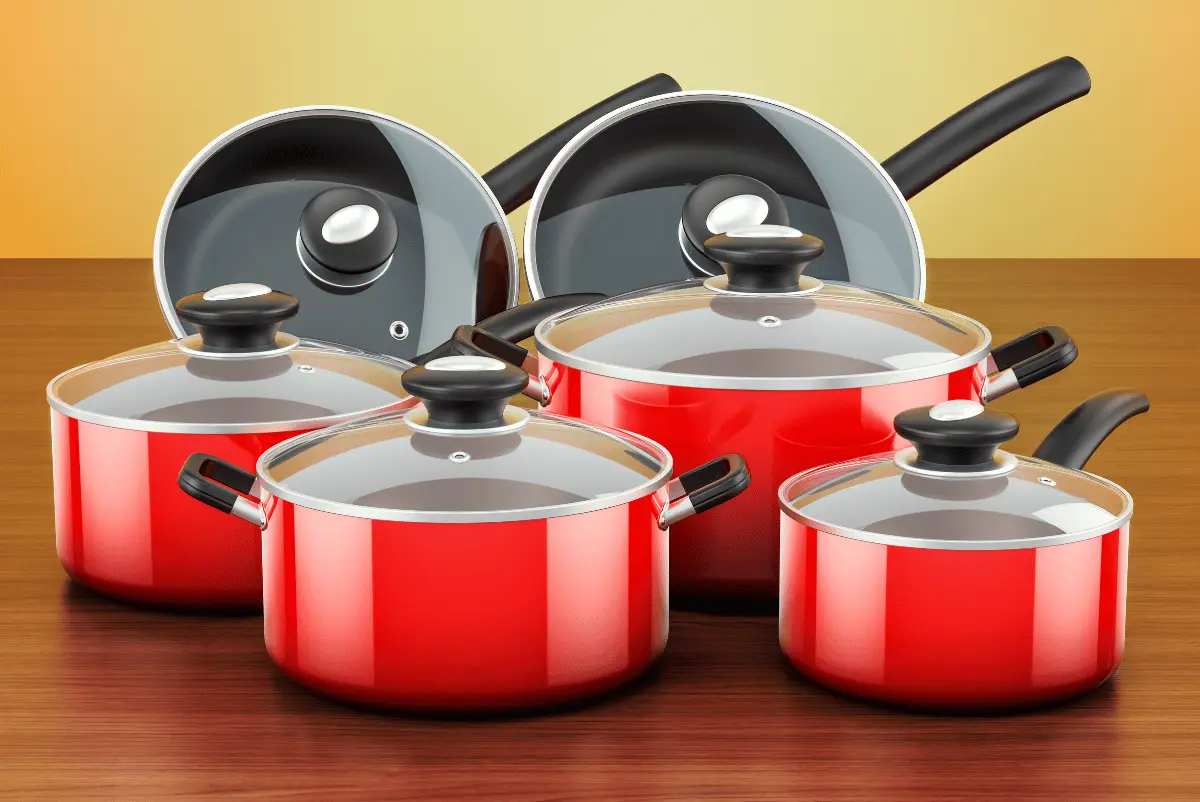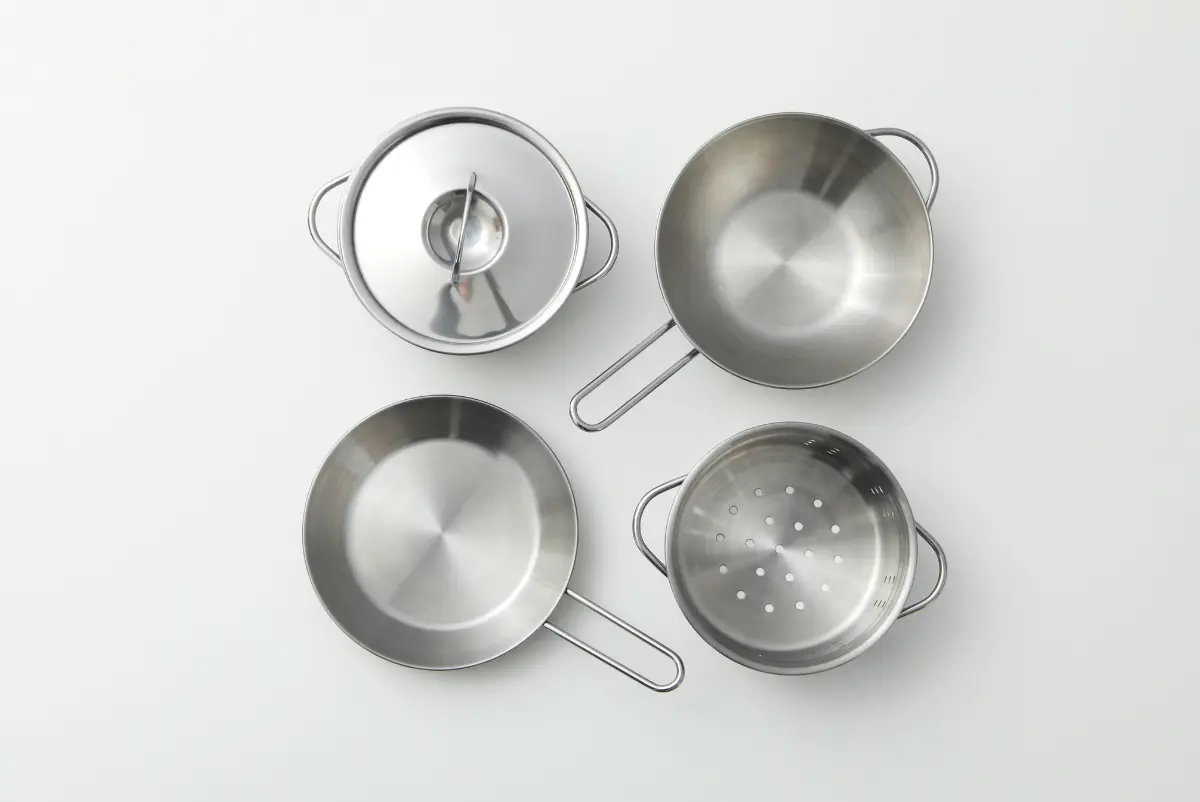For those who love to cook, quality cookware is an integral part of the culinary journey, influencing the taste and success of our dishes. As I look back at my own cooking experiences, Club Aluminum Cookware holds a special place in my heart. With its colorful exterior and non-stick capabilities, it was a favorite amongst many households, including my grandmother’s.
Is Aluminum Cookware Still Made?
Yes, aluminum cookware is still being made. However, the original “Club” Aluminum Cookware, which was highly popular in the early 1900s, ceased production in the late 20th century. Currently, many manufacturers produce aluminum cookware due to its excellent heat conductivity and affordability, often incorporating modern features such as non-stick coatings and induction-ready bases.

There is still a lot of the club aluminum cookware available for sale, through second-hand dealers, antique shops, or stores online.
Club Cookware History – The Golden Era of Club Aluminum Cookware
The Club Aluminum Cookware range was a sensation when it hit the market in the early 1900s. Sporting vibrant colors from green and turquoise to pink and brown, they added a touch of elegance and charm to every kitchen.
Beyond their aesthetic appeal, these pots and pans were known for their affordability, excellent heat conductivity, and oven-safe properties. The tight-fitting lids and wooden handles made them easy to handle, contributing to their widespread popularity.

These beloved kitchen essentials were more than just cooking utensils; they became part of our cooking story. My grandmother, God rest her soul, was a proud owner of a Club Aluminum Cookware set, and her delicious dishes are a testament to its quality.
What Happened to Club Cookware?
In 1925, the Club Aluminum Utensils Company unveiled their first set of cookware made from processed hardened aluminum. This innovative product was designed to last a lifetime, as stated in their official cookbook release. Interestingly, the Club cookware wasn’t initially sold in stores, but rather through parties – a concept that even predates Tupperware, Pampered Chef, or Avon parties.
The 1930s brought tough times. The Great Depression made it difficult for the average person to afford these parties. By 1933, the Club Aluminum Cookware Company declared bankruptcy, and the brand changed hands a couple of times, finally landing with the Mirro Aluminum Company, its current owner.
Is It Safe to Use?
Yes, using aluminum cookware is generally considered safe. However, it’s essential to use it correctly. Avoid cooking acidic or alkaline foods in uncoated aluminum pots and pans, as this can cause more aluminum than usual to leach into the food.
Most modern aluminum cookware is coated with a non-stick material, which significantly reduces any potential leaching. As with any cookware, avoid using it if it’s heavily scratched or damaged.
Can You Make an Aluminum Pan Non-Stick?
While aluminum pans are excellent heat conductors and often have a seemingly non-stick finish, they are not naturally non-stick on the inside, unless they are later coated with Teflon.
If you own a traditional non-non-stick aluminum pan, don’t worry! You can easily make it non-stick through a process called seasoning. When I say seasoning, I don’t mean adding some pepper or curry leaves to your pan, haha. Seasoning refers to the process of curing or coating a pan with oils, butter, or fat, which makes it non-stick, easy to clean, and rust-resistant.
There are different methods to season your aluminum pans or any other cookware to achieve that desirable non-stick effect. However, I’ll share the two methods my grandmother taught me, which have proven to be effective.
Method 1: Thorough Seasoning
- Thoroughly clean your pan to remove any dirt, as a dirty pan defeats the purpose of seasoning.
- Preheat the pan on low or medium heat.
- Add a generous amount of oil to the pan, ensuring the entire surface is evenly coated at all times. You can use any oil or fat of your choice.
- Heat the oil until it starts smoking, and let it smoke for 5-10 seconds before turning off the heat.
- Remove the pan from the hot burner and allow it to cool naturally to room temperature.
- Once cool, pour out the excess oil and wipe off any remaining residue. Your pan is now seasoned and ready to use.
Method 2: Simple Seasoning
- After cleaning the pan, preheat it.
- Use a paper towel to apply a small amount of oil or fat onto the pan’s surface.
- Once the oil is applied, let the pan heat up for approximately 10 minutes until it begins to smoke.
- Turn off the heat and allow the pan to cool.
- Your pan is now well-seasoned and ready for use.
Remember, overheating your pan can cause food to burn and stick to the surface, so it’s important to avoid this. Additionally, regular seasoning is crucial, especially if you frequently use your cookware. Even when not in regular use, seasoning your pans and pots helps maintain their non-stick properties and prevents rusting.
How to Clean Club Aluminum Cookware
Proper cleaning of your club aluminum cookware is essential for maintaining its longevity, durability, and safety. Although the aluminum cookware company released an official cookbook with guidelines on how to clean and care for your aluminum cookware, I’d like to share some practical steps and tips passed down from my grandmother.
- Avoid using harsh detergents or abrasive sponges, as they can scratch the surface or remove the seasoning of your aluminum pans and pots.
- Dishwashers should also be avoided, as the harsh detergents can cause pitting, loss of seasoning, and even rusting.
- Gently hand wash your aluminum pan using soap and warm water to remove dirt, oil, and food residue.
- For tougher or burnt residue, let the pan soak in warm water for a while, then use a soft washcloth to clean it off.
- Rinse the pan thoroughly and allow it to dry completely before storing.
By following these simple steps, you can maintain and extend the lifespan of your aluminum cookware while ensuring it remains in excellent condition for safe and enjoyable cooking experiences.
In Conclusion
While the original Club Aluminum Cookware is no longer in production, you can still find these coveted pieces on the secondary market. However, avoid using old pots and pans with scratches or dents for cooking. Instead, these vintage items could be recycled or even used as decorative pieces, bringing a touch of nostalgia to your kitchen.
